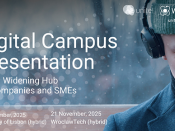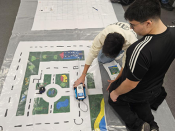Por Daniel Bonn (Van der Waals-Zeeman Institute, Universiteit van Amsterdam, the Netherlands).
Ice is slippery - but why? This seemingly simple physics question turns out to have a remarkably intricate answer. We recently shed new light on how temperature, pressure and the speed of the skater combine to make it possible to skate on ice.
As most people have experienced - either by accident or when wearing ice skates - ice is exceptionally slippery. The question why this is the case remains unanswered however, even after 150 years of research on the topic. Our research shows that the slipperiness of ice is caused by highly mobile H2O molecules at the ice surface. The friction is not always the same: we show in our study that the mobility of the molecules - and therefore the slipperiness of the ice - can be suppressed by increasing the contact pressure or lowering the temperature.
It is commonly believed that ice is slippery due to the presence of a thin layer of liquid water on top of the ice surface, which lubricates the sliding contact. The origin of this liquid water, however, remains highly debated. The very first explanation was put forward by John Joly in 1886. He suggested that the local pressure of a skate on the ice results in it melting into liquid water. However, it turned out that this could not be the whole story, as the pressure melting effect would require unrealistically high contact pressures - in particular at ice temperatures below -3.5°C, which are easily reached in frozen canals and on speed skate rinks.
Nowadays, frictional melting is thought to be at the origin of the lubricating water layer: heat generated during the sliding melts some of the ice which lubricates the sliding of the skate on the ice. However, this is certainly not the complete story. As we all know, water can indeed turn a road or a kitchen floor into a slippery surface - provided the slider is soft, like a rubber shoe or tire, and moves at a high velocity. Ice, in contrast, is also slippery when contacted with the hard surface of an ice skate, and even when that skate is sliding slowly. Therefore, it seems like still something more is happening on the ice surface.
Zoom:
Topic: CFTC weekly seminar
Time: Feb 25, 2021 10:00 AM Lisbon
Join from PC, Mac, Linux, iOS or Android
Or iPhone one-tap: 211202618,83630232849# or 308804188,83630232849#
Or Telephone:
Dial: +351 211 202 618 (Portugal Toll) or +351 308 804 188 (Portugal Toll)
Meeting ID: 836 3023 2849
International numbers available
Or a H.323/SIP room system:
H.323: 162.255.37.11 (US West) or 162.255.36.11 (US East)
Meeting ID: 836 3023 2849





















